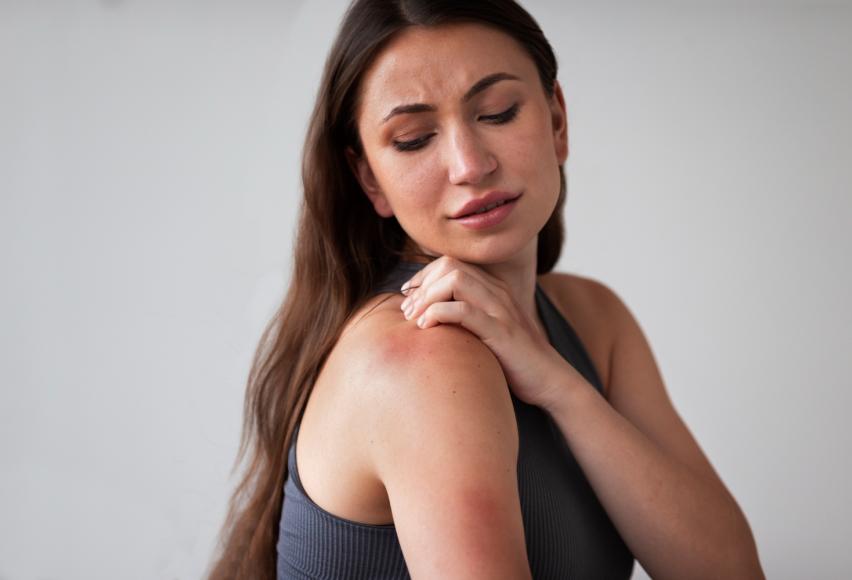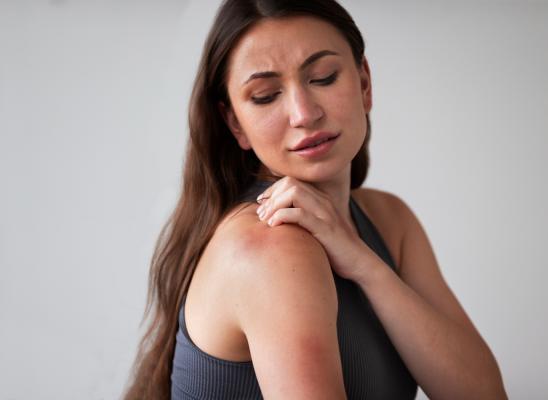Doesn’t That Hurt? Skin Picking and Pain Perception

Online test
Find out the severity of your symptoms with this free online test
Pain is a highly subjective physical experience. Some people are highly sensitive to pain. Others have what is commonly referred to as a “high pain tolerance.” Psychological issues including depression or anxiety, even our expectations and beliefs about pain, have been shown to influence one’s pain response. There are also variations in pain sensation pathways that can enhance, mask, or even prevent the sensation of pain.
Does skin picking hurt? When people with body-focused repetitive disorders (BFRBs) like skin picking describe their sensory experience, pain is not usually a sensation they identify. In fact, anecdotal and empirical evidence overwhelmingly indicates that the sensations associated with skin picking are most often associated with pleasure or relief. This diminished pain sensation suggests some underlying process that may moderate pain sensation. Just why do people who pick their skin seem to have a diminished pain response? Researchers have wondered too.
Skin Picking and Pain Response
Just why someone who picks their skin seems to experience less pain is not well understood. Skin picking disorder (SPD) is the repeated picking of the skin resulting in significant tissue damage. Skin picking is usually accompanied by reduced quality of life, impaired psychosocial functioning, and dermatological problems such as skin infections. Picking episodes can sometimes last for hours. Skin picking would likely be quite painful for most people. For people with SPD, there seems to be something that dulls or diminishes the sensation of pain allowing them to engage in picking for long periods of time, without succumbing to pain. It’s not unreasonable to ask, do they experience pain in the same way people without SPD might?
Previous research explored that very question. Using a pain inducing technique called a cold pressor test (CPT), researchers studied pain responses for people with and without SPD. Both groups had similar perceptions of pain. However, people with SPD demonstrated a diminished autonomic response to pain as measured by heart rate and blood pressure. Those findings suggested that the picking behavior may desensitize them to pain. Picking is often an attempt to reduce feelings of distress so picking may actually calm the automimic nervous system, lowering heart rate and blood pressure, resulting in feelings of calm and relief.
Skin picking and other BFRBs also often co-occur with depression. Depression is known to play a significant role in pain perception. Could co-occurring depression play a role in the diminished pain response seen in people with SPD?
In what is thought to be the first of its kind, a new study builds on previous findings on SPD and pain to explore the role that depression might play in the perception of pain in people with SPD and trichotillomania (TTM).
Unexpected Results
Like previous pain studies, this study also utilized the CPT. Participants were people who met the diagnostic criteria for SPD or TTM and a control group of individuals with no psychiatric history.
The researchers had several hypotheses:
1. Individuals with TTM or SPD would report less pain and longer latency to pain tolerance than the control group.
2. More severe pulling/picking would be associated with lower pain ratings.
3. There would be objective physiological findings consistent with the difference in subjective pain perception between the diagnostic groups and controls.
4. Participants with SPD or TTM and comorbid depression (associated with increased pain sensitivity) would report greater pain than those without co-occurring depression.
The study did not find support for their hypotheses:
1. The SPD and TTM groups and the controls showed no significant differences in their pain ratings and latency to pain tolerance.
2. Picking/pulling severity was not associated with pain ratings in any of the groups.
3. Participants in the TTM group experienced a higher mean diastolic blood pressure than the SPD or control groups. There were no other significant group differences in terms of pain and any of the physiological measurements.
4. Pain perception did not differ between those with and those without lifetime depression.
The researchers offer several possible reasons for their negative findings:
- They note that their sample size was a small one, even though it was the largest sample of individuals with BFRBs to date in which pain perception and cardiovascular parameters have been studied.
- The number of male participants was too low to examine gender differences.
- Their findings that people with and without BFRBs have similar perceptions of pain are in keeping with some previous studies and speculate that some people may indeed engage in some skin picking without experiencing significant pain.
- The reason for the elevated diastolic BP in the TTM group is unclear. They point to the known relationship between cardiovascular and pain regulatory systems and suggest further study with a larger sample size.
- They suggest that reduced pain perception or lack of autonomic response may be due to the habituation of pain from repetitive pulling or picking or even damage to pain receptors in the skin.
- Finally, they suggest that pain may not be as central to BFRBs as other drivers of skin picking and hair pulling such as reward processing.
The Research Continues
While there does seem to be a disconnect between the perception of pain and the autonomic pain response in people who compulsively pick at their skin, there seems to be much more to learn about these processes. The study authors advocate for further research and offer recommendations for future directions.
Even though the study’s results were largely negative with respect to their hypotheses, these studies are no less important and valuable to future research. The results serve as a guide for researchers who continue to seek greater understanding of skin picking and hope to people living with BFRBs for more effective and innovative treatment approaches.
References
1. Linton, S. J., & Shaw, W. S. (2011). Impact of psychological factors in the experience of pain. Physical Therapy, 91(5), 700-711. https://academic.oup.com/ptj/article/91/5/700/2735743
2. Institute of Medicine, & Committee on Pain; Disability; and Chronic Illness Behavior. (1987). The Anatomy and Physiology of Pain. In Pain and disability: Clinical, behavioral, and public policy perspectives. National Academies Press. https://www.ncbi.nlm.nih.gov/books/NBK219252/
3. Grant, J. E., Redden, S. A., & Chamberlain, S. R. (2017). Cold pressor pain in skin picking disorder. Psychiatry research, 249, 35–38. https://www.ncbi.nlm.nih.gov/pmc/articles/PMC5345741/
4. Lochner, C., Roos, J., Kidd, M., Hendricks, G., Peris, T. S., Ricketts, E. J., Dougherty, D. D., Woods, D. W., Keuthen, N. J., Stein, D. J., Grant, J. E., & Piacentini, J. (2022). Pain perception and physiological correlates in body-focused repetitive behavior disorders. CNS Spectrums, 28(2), 197-204. https://www.cambridge.org/core/services/aop-cambridge-core/content/view/320340551F6E2AC30D062DB756A12E6E/S1092852922000062a.pdf/pain-perception-and-physiological-correlates-in-body-focused-repetitive-behavior-disorders.pdf
Online test
Find out the severity of your symptoms with this free online test
Start your journey with SkinPick
Take control of your life and find freedom from skin picking through professional therapy and evidence-based behavioral techniques.
Start Now



